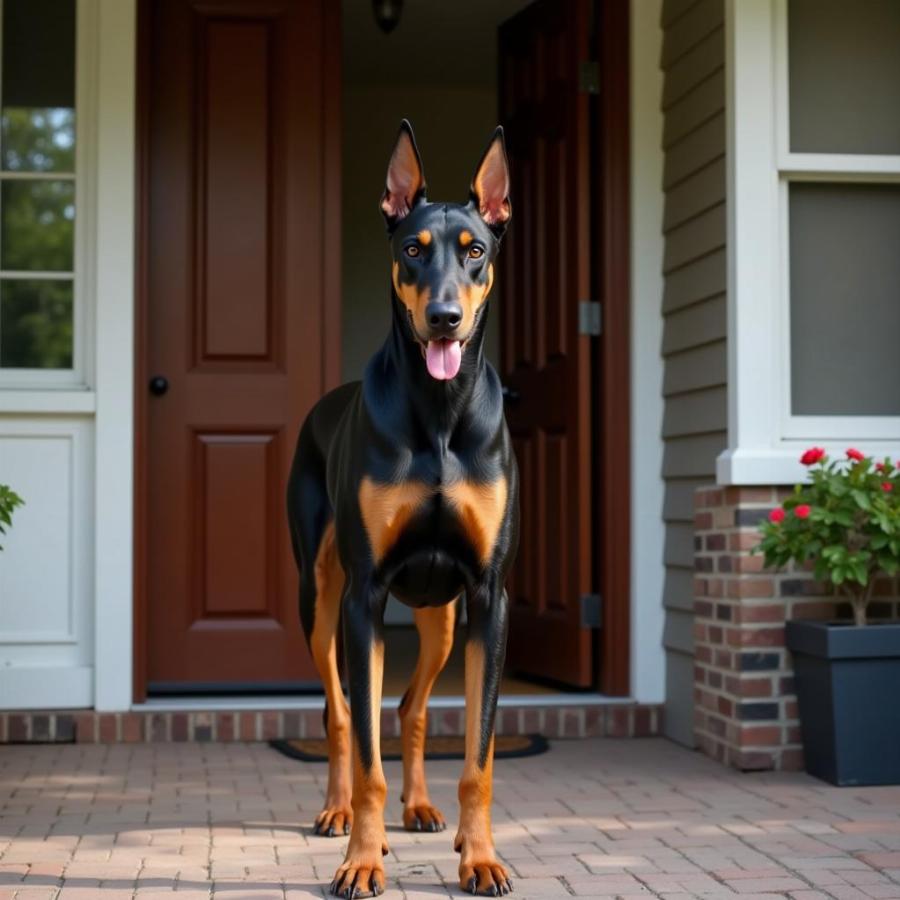The term “natural Doberman dog” often sparks curiosity, bringing to mind images of a dog less influenced by selective breeding. While all Dobermans share core traits, understanding the nuances of their natural tendencies, temperament, and physical characteristics is crucial for responsible ownership. This article delves into the world of the natural Doberman, exploring their history, behavioral instincts, and what to expect when welcoming one into your family.
Unraveling the Doberman’s History and Natural Instincts
The Doberman Pinscher, often simply called the Doberman, wasn’t born in a vacuum. Karl Friedrich Louis Dobermann, a late 19th-century German tax collector, developed the breed for protection. His goal was a dog with an imposing presence, unwavering loyalty, and a natural instinct to guard. These foundational traits, coupled with intelligence and trainability, are the cornerstones of the “natural Doberman dog.” While specific physical features have been emphasized over time through breeding, the core temperament remains a testament to Dobermann’s original vision.
So, what exactly are these natural instincts? Dobermans are inherently protective and territorial. They possess a keen alertness, always watchful of their surroundings and quick to react to perceived threats. This doesn’t mean they are naturally aggressive. Their protective nature stems from loyalty and a deep-seated desire to safeguard their family and home.
 Natural Doberman Guarding Home
Natural Doberman Guarding Home
Understanding Temperament: Beyond the Guard Dog Persona
While their guarding instincts are prominent, “natural Doberman dogs” are much more than just protectors. They are highly intelligent, eager to please, and form strong bonds with their families. They thrive on human interaction and enjoy being involved in family activities. Their intelligence also makes them highly trainable, excelling in various canine sports and activities. This combination of intelligence, loyalty, and trainability makes them suitable companions for experienced dog owners who can provide consistent training and socialization.
Is a natural Doberman right for you? Consider your lifestyle and experience with dogs. Dobermans require consistent training and socialization from an early age to ensure they develop into well-adjusted adults. Their protective nature can be channeled into positive behaviors through proper guidance.
Physical Characteristics: The Natural Doberman Build
What does a “natural Doberman dog” look like? While breed standards have evolved, a natural Doberman generally possesses a strong, muscular build with an athletic and elegant appearance. They are known for their sleek, short coat, commonly black and tan, or red and tan. Their natural physique reflects their working origins, designed for agility, speed, and endurance. A healthy, well-proportioned Doberman embodies these physical characteristics, reflecting the breed’s inherent athleticism.
What about White Dobermans? A Note on Genetics
The term “natural” sometimes arises in discussions about white Dobermans. It’s important to clarify that white Dobermans are not a separate, more natural breed. They are the result of a recessive gene and are prone to specific health issues, including increased sensitivity to sunlight and potential vision and hearing problems. While beautiful, responsible breeding practices prioritize the health and well-being of the dogs. If you’re interested in a doberman white dog, thorough research is essential.
Caring for Your Natural Doberman: Meeting Their Needs
Providing a “natural Doberman dog” with proper care involves understanding their specific needs. This includes a balanced diet, regular exercise, mental stimulation, and ongoing training. Dobermans thrive on activity, both physical and mental. Daily walks, playtime, and engaging training sessions are essential for their overall well-being.
Conclusion: Embracing the Natural Doberman
The “natural Doberman dog” embodies a unique blend of protective instincts, intelligence, and loyalty. Understanding their history, temperament, and specific needs is essential for responsible ownership. By providing consistent training, socialization, and a loving environment, you can help your natural Doberman thrive and become a cherished member of your family.
FAQs about Natural Doberman Dogs
- Are natural Dobermans more aggressive? No, a “natural Doberman dog” is not inherently more aggressive. Their protective instincts can be channeled through proper training and socialization.
- Do natural Dobermans require a lot of exercise? Yes, they are energetic dogs and require regular exercise and mental stimulation.
- Are natural Dobermans good with children? With proper socialization and supervision, they can be good family dogs.
- What is the lifespan of a natural Doberman? The average lifespan is around 10-12 years.
- Are natural Dobermans prone to any health issues? Like all breeds, they can be prone to certain health conditions, such as dilated cardiomyopathy and von Willebrand’s disease.
- What are some dogs similar to doberman? Breeds like the Rottweiler, German Shepherd, and Beauceron share some similarities with Dobermans.
- Where can I find more pictures of doberman pinscher dogs? Many online resources and breed-specific websites showcase photos of Dobermans.
Further Exploration: Delving Deeper into Dog Ownership
Are you interested in learning more about other fascinating breeds? Check out our articles on dogs with eyebrows and the top 10 police dog breeds for more insights into the canine world.
Beaut Dogs is your trusted source for comprehensive information on the world of dog breeds. We offer expert advice and guidance on everything from breed selection to responsible ownership. For personalized support and answers to your specific questions about “natural Doberman dogs” or any other breed, contact us at [email protected]. We’re here to help you navigate the wonderful journey of dog ownership. Visit us at https://beautdogs.com to explore our extensive library of resources.